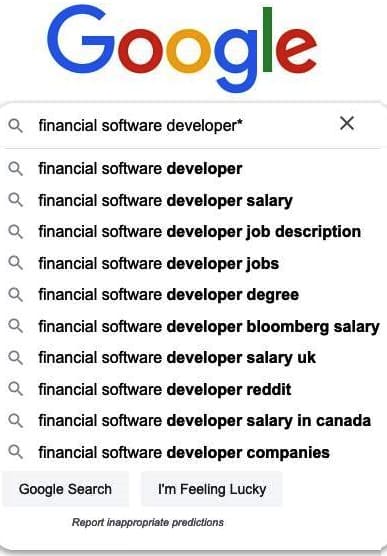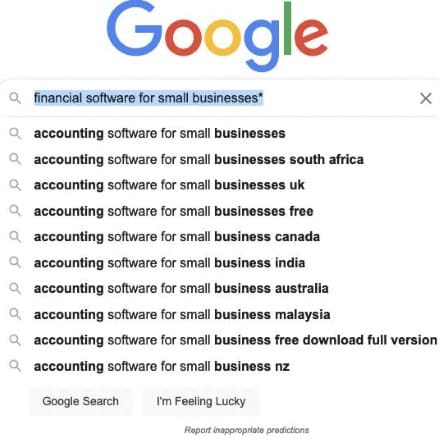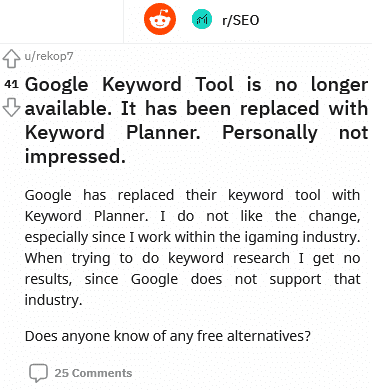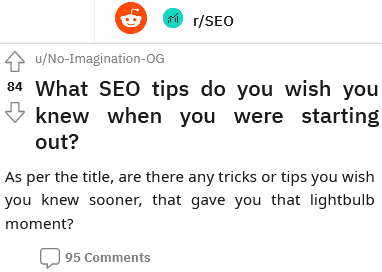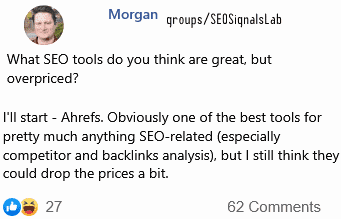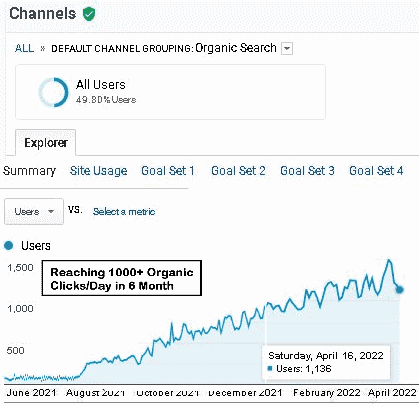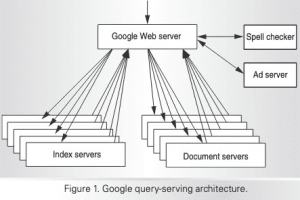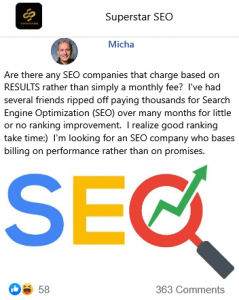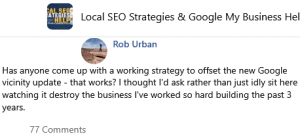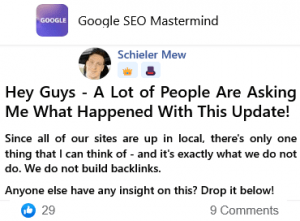Schieler Mew 👑🎩
Without further adieu
Part III of "Launch Pad" Method – Keyword Planning Without Keyword Planners 🚀🚀🚀
Forward note – this is going to be extremely uncomfortable for some SEO users to hear, and I don't expect everyone to agree with this process.
With that said, let's jump in!
Ever wondered how Keyword Planners actually work? Why they show 250,000 for some keywords and 10 for others?
Well, here's what you probably don't know!
Keyword planners are what is known as "Packed" queries. When you head over to your favorite keyword planner and dump in your "Seed" money keyword of "Financial Software", your keyword planner is not showing you results for "Financial Software", it's showing you any search that contained "Financial Software"
Pretty neat right?
With that in mind, it's important to remember that Keyword planners were initially created to make you spend money, not separate keyword queries for you, or help you build a comprehensive cluster.
So – how do we "Unpack" these queries and is there anyway to interpret organic keywords, rather than depending on keyword planners that are derived from ad software, or that also pack these keywords?
Note: Keyword planners pack queries because the computational resources needed to show you every query under a seed query, without a direct search is a lot, and quite honestly it's a lot of data to process, even as a human trying to create a strategy.
Well here's how we treat our keywords like a moving company, and unpack them (bad pun hun lol)!
Head to Google Search
Type in your seed keyword and add an asterisk, like this: Financial Software*
What this does is unpack the most relevant and highest searched terms in Googles Organic Search, which is why you will now see these key-phrases as auto suggestions, because Google has aggregated the data and is suggesting to you what the highest searches are.
Neat right?
Let's keep going!
Now that you have the next highest organic search terms from your seed query, you can also begin to unpack these. Example:
financial software and systems*
Now take it a step back, back to financial software* and then select the second highest organic unpacked result. Example:
financial software for small businesses*
Now let's do it one more time, and we get:
financial software developer*
Do you realize what we just did with all our queries that have been unpacked from the seed keyword?
We created silos of content, that Google recognizes as silos, through an unpacked organic strategy. So now we have three categories that stem off our seed keyword, and at least 9 blogs/articles for each category through auto suggest.
Well, let's take it even further…why stop here?
Ever heard of the part of speech known in English as an interrogative?
Most people haven't, but they are simply the "Who, What, When, Where, Why and How" parts of speech that are appended to subjects and topics.
Can you guess what we're going to do next? Let's jump back up to our silo of "Financial Software and Systems" and add an interrogative of "How". Example:
what financial software for small businesses*
Now we have an additional tertiary silo of at least 4-8 more topics we can fit into our main silo
Now imagine you built a website that covered the who, what, when, where, why, and how's of every major secondary key-phrase, leading back up to your seed keywords
In data sciences, we call this "Agglomeration Hierarchical Clustering" and congratulations, because if you do this, you just communicated to Google that your website answers every query that Google has deemed 1000% relevant to it's users and searchers in this niche by using a reversed engineering process.
Interlink all those together the same way Google does on your website, and watch your rankings begin to "Launch Pad"
187 👍🏽55 💟24646 💬🗨
📰👈
📰👈
📰👈
I don't give a F@#%*@ what other groups admin and busienss owners are talking about you. But in your group you are dropping some gems here… I have not seen something this high quality info in any other group. It's them either discrediting someone work etc… your group is judgment free zone for real bro great work with this post. Again I don't normally comment on any post but I had to do it for this.
Great work brotha
👍🏽💟5
Always happy to be of service my man!
media1.tenor.co
MEDIA1.TENOR.COmedia1.tenor.co
💟2
Patel » Schieler Mew
Let's get it man don't listen to trash talkers on the internet they just can't see someone succeed and at the same time help other grow…
Schieler Mew ✍️ 👑 » Patel
Wait! Other groups admins talk about me lol. I just re-read your comment. Interesting
🤭1
Schieler Mew ✍️ 👑
Always 🙂
Schieler Mew ✍️ 👑 » Abana
Too the moon brother!
Abana » Schieler Mew
🙌
Alex
Overall, great summary. The keyword planner was generated to help Google employees (I was one) sell Google ads using math. Google ad sales people will tell you that you have a 3% chance of converting as it's a low number and people want to be able to break down the numbers so they can make educated decisions and that is from the tops of Google to be a safe number. Now with that said you can tell a customer okay you need 100 clicks per day for evidence to ensure that you get your 3% every day. I am going to look up your top 10 keywords and we are going to take an average of the cost using the keyword planner. Let's say the average is $8 a click, you need $800 a day for a budget, and you need to be able to make at least $800 after the sale for the ads to be worth it. "will you make $800 on 3 sales customer?" If yes, Great! Let's start there and get you making money. IF no, well then you may not want to play the numbers, you are free to try it on your own, of course, there are no guarantees in advertising and if you don't have enough for at least 10 clicks per day you're gambling.
Figured I would lend some missing information as to the real use for the keyword planner. The keyword planner isn't really relevant to SEO's as we focus on answering questions and linking those questions to main "money" pages to rank them. The who what when where why are 5 pages of a cluster and theoretically should be done for every core service page.. "ain't nobody got time for dat!". There is more to this of course but as I am lazy and do pay per sale I prefer not to divulge other tactics as that's half of the knowledge of being an "SEO Pro" I think it's more like being a scientist. Use the Scientific Method until you get the result you want, and create a pseudoscience out of it that's really the best advice for anyone trying to get into this field cause no one is going to give you their main tactics free.
💟👍🏽16
My man! I Golden nuggets, for anyone following.
Like you said, "Aint no one got time for that", but the ones who do…well, you and I both know what happens.
Glad to see someone else shedding light on how Google keyword planner was never devised for organic strategies. A very hard concept for most to grasp!
Alex » Schieler Mew
Yeah they told us this straight up, don't use KWP or Spyfu because people were giving false information. Your best bet is to try what you think and use Search Console for KWR and go from there, you're more likely to get an idea of longtail keywords that actually get searches so you can blog about them.
💟👍🏽3
Schieler Mew ✍️ 👑 » Alex
I don't think people realize most keyword planners work this way, through GAds API
It's all the same data, or near close. They throw one keyword planner on a podium and then don't understand why theirs small variations in data subsets.
If an SEO ever needs longtail keywords, Google already shows them what it wants, and it's right in the SERPs, and all they have to do is look. Heck, Google even tells you what type of content and intent it wants in the top 5 positions as well, from User Interface (UI)User Experience (UX) to Tonal Quality of the literature and content.
It's always right in front of us 🙂
💟👍🏽3
Alex » Schieler Mew
Sort of, Google is win more in that when you go for long-tail keywords and win them, you build a reputation. Winning things like FAQ snippets for questions and such not only get you traffic but actually have a hidden trust factor associated with them. My research has actually shown that backlinks make very little difference in your rankings and you're better off just buying Domain Authority (DA)-Domain Rating (DR) increasers off Fiverr for $10 since they're vanity metrics. Often moving the needle only 2-5 slots, which for most people (those not on page 1) aren't going to notice anyways.The UXUI only matters for conversions, Google claims that it matters to them but it doesn't. That said it should definitely matter to you as your site is your main salesperson, and often the first impression of your product. Basically, you need to win or answer queries about the topic on your site to rank for the page. Think like Reddit, Quora, and Yelp. They offer answers to questions even though they are user-submitted, however, if a company with actual authority answers those questions in say a blog they out rank them, and increase their main word ranking. It's interesting and never talked about amongst "Gurus".
Schieler Mew ✍️ 👑 » Alex
We're talking about recursion based authority, correct? In which the total sum of all aggregated position queries that are won is equal to the authority distribution of its self?
I've been modeling this for a while, and using content only websites to prove the theory that Google uses a mathematical value to assign authority to the "Wins" you have made, and re-applies it to documents you create that are new, ultimately allowing you to gain authority over a niche and rank higher terms as the total sum increases.
Alex » Schieler Mew
Yes, but it isn't just limited to your site. The reasons backlinks seem to work is they are answering a question and linking the traffic to you. So a backlink that is ranking number 1 for your word would have value because they already have built that trust "authority" with Google either using their own PBN of blogs answering questions or answering them on their main site blog section. I have even seen companies go as far as making a .blog subdomain to answer questions without bogging down their main domain's resources keeping site load speed down.
I thought about making courses, but I feel like those guys are the ones ruining the industry so… I would be a hypocrite haha.
Schieler Mew ✍️ 👑 » Alex
Same haha. I also find it very hard to explain Search Engine Optimization (SEO) in terms that everyone can comprehend in our group surveys. Been working very hard at that the past year!
Appreciate all the information and conversation brother! I will look out for the course haha
Alex » Schieler Mew
I don't want to make a course as I don't want more people selling snake oil. Granted I really can't control that either so maybe one day. For now, I am just building a Pay Per Sale organization. Great chat, if you have questions just ask I will answer to the best of my abilities. I love what you do here for people.
💟👍🏽4
📰👈
Rizzo
What you think of keyword cupid or similar cluster keyword service Schieler Mew
– I believe Keyword Chef – Keywords for Publishers may use a similar model but I'm not entirely sure.
Ben » Schieler Mew
Yep, with keyword Chef you can import keywords and it will group them together based in similiar SERPs. I made a video today on how that works in my group 🙂
💟👍🏽3
Dolman » Rizzo
These tools typically group and cluster keywords based on the current SERPs for each and the overlap of URLs between each query, not the actual search demand of the topic itself or the underlying search intent associated with the seed topic.
Generally speaking, they work as follows…
If X or more of the URLs in the Search Engine Result Page (SERP) for query #1 are the same for query #2, then cluster query #1 and query #2 into the same group.
If X or less of the URLs in the SERP for query #1 are the same for query #2, then do not cluster query #1 and query #2 into the same group.
As such, they are only as good as the data they are given when making such determinations and if the gap between the existing supply of content (URLs in the SERP) and demand for the topic (keywords being searched that are related to the seed topic) is quite large, they are going to miscategorize and fail to categorize keywords into topics that quite clearly should be if you've properly researched the niche, know your target audience and have developed a keyword content map of the topic that will guide and direct such decisions as you establish the architecture, navigation and internal links for your site.
Kumar
Thanks for sharing Schieler Mew have a question . What is the difference in search suggestion when i add a space or a *? I see around a 50% similarity in suggested keywords.
One is a direct unpacking of the terms, and the other are similar "people also ask" or suggestions in the same topical hierarchy.
They do go hand in hand for the most part! Great observation
💟1
Kumar
Ok got it . Relevancy of keyword to the business is definitely a manual process and atleast till the near future, it won't be replaced by technology. This post does add a new dimension towards keyword research. Appreciate your contribution 👏
💟1
Brian » Schieler Mew
One question. Once you're done with this KR. Is it advisable to write content on each result separately or you can write one long article with the various keywords as H2?
Hey Brian, excellent question! I was going to cover this in Part IV but essentially you want to assess and analyze the overlap rate of each keyword before deciding whether or not Google has already ranked articles with the same synonymous phrasing, or not.
Always use Google as the guide! I will jump more into this on the next part 🙂
💟👍🏽5
Brian » Schieler Mew
Thank you will be waiting. When do you intend to throw in part IV?
Akinola
I've read some articles on Agglomeration Hierarchical Clustering and the only thing I could get out of them is to just "write content on similarly related topics" too many complicated stuffs for me to understand.
But this one you just made, brilliantly explained how to do it and explaining how to do it first before revealing its agglomeration hierarchical clustering just blew my mind.
Thank you for finally helping understand. Really cool stuff 😂
💟👍🏽4
Daniel S. Nielsen
Great post, very valuable info 👍 IMO keyword planners are not all useless though, as the give you an idea about search volumes, while Google auto suggestions are based a lot on what's trending at the moment. Both are useful though, but I would rather use both than pick one over the other. Because what is a "trending" keyword worth if there's is no real volume 🙂
Daniel S. Nielsen
There's plenty of keywords Google shows no traffic for or volume, that has lead SEO users to hundreds of thousands of extra clicks
That's why keyword Chef and Cupid is so big right now 🙂
Daniel S. Nielsen » Schieler Mew
Of course, it is important to mention that for low volume keywords, there's always synonyms to be explored as well. It all can lead to more traffic.
There are niches too, that just don't get many searches. If I optimize a shop for outdoor jacuzzi in my home town (unknown and with maybe 5000 residents), getting hit with hundreds of thousands of visitors every month would definitely lead me to suspect something was off, and not just being great SEO work 😅
📰👈
Niclas » Schieler Mew
Thx for sharing. Great post. Please explain why some SEO wouldn't agree with this?
Stuck in old habits that signals or Backlinks are all the juice you need for a website.
Niclas » Alex
Aha okay.
Schieler Mew ✍️ 👑 » Niclas
What Alex said above is 1000% correct.
If you try to explain to an older SEO that authority can be built internally, and not just externally they will block you from their groups, and try to blackball you 😂😂
🤭👍🏽2
Niclas » Schieler Mew
Lol but i don't get, how they get stuck with those beliefs. I mean if they work with SEO, they should stay up to date right or find something else to do. I mean even if they believe backlinks are the only thing that's necessary, how can they think that, when we know, content is king. Makes no since.
Just realized my post made no since ha ha. I mean content I king. Ha ha.
Romano
You've done a great job here Schieler Mew by breaking down and explaining how to do keyword research for free. I'm in a ton of Facebook groups and everyone is always touting various keyword planners– usually because they are affiliates who want referral rewards. The truth of the matter is that keyword planning through Google is not only free, but it's also the best because it's the world's most popular search engine.
💟👍🏽2
Traian » Schieler Mew
"Agglomeration Clustering" finally explained! Thank You, Sir! Much appreciate you 🙂
My take away from this is the following… starting with the main/seed keyword, all the suggestions are part of the same topical page? Or each suggestion is associated with a different topic/page on the site??
Moving further with the second suggestion and applying the astherics to > financial software and systems*… all the suggestions from this one are part of the feature Financial Software and Systems page???! And so on with each suggestion…
Cheers!
💟👍🏽2
Hey there,
They would be apart of the same silo. If you want to know if the terms are synonymous for ranking on a per page basis, you would have to preform an overlap analysis of each kewyord, which I plan to cover in Launch Pad IV.
Traian » Schieler Mew
Aha… so this called Agglomeration Clustering is just about finding keywords I then still mapping, what goes on each page, right?!
Schieler Mew ✍️ 👑 » Traian
Yup, you nailed it! Agglomerative clustering, helps you cluster topics.
Whether those topics have an overlap rate or not, still must be assessed!
Traian » Schieler Mew
Much clear now. I was thinking this method will help me figuring out what goes on each page by using this astherics, actually creating silos semi-automatically 😃… but I still need to work on the suggestions by arrange them each on those silo I should create.
Schieler Mew ✍️ 👑 » Traian
Correct. At first glance, these COULD be what goes on each page, or they could be topics for independent pages, but it has to be explored, to be 1000% sure.
💟1
Ryan
Awesome share Schieler Mew! Am I correct in assuming that you don't even factor in search volume? Or, is it just that you factor in search volume later, when prioritizing or something?
All of Google auto suggestions are the most popular searches terms.
No need to verify volume, Google has already shown you what most people are searching 🙂
💟👍🏽5
Ryan » Schieler Mew
Makes perfect sense. Thx!
Scott
Yelp attempts similar on a smaller scale. Been doing this for years with excellent results. Targeting actual search phrases (THAT PEOPLE USE 😮) vs keywords should be a no-brainer. Google drops lots of hints similar to this. Maybe search queries in GBP insights?
💟👍🏽2
📰👈
Google uses Natural Language Processing (NLP) instead of Latent Semantic Indexing (LSI) due to Both Different Patent Owners
The Summary of Discussion 1: Google Keyword Tool Planner Provides You With Estimated Traffic Keywords and the Bid Amount
u/rekop7
Google Keyword Tool is no longer available. It has been replaced with Keyword Planner. Personally not impressed.
Google has replaced their keyword tool with Keyword Planner. I do not like the change, especially since I work within the igaming industry. When trying to do keyword research I get no results, since Google does not support that industry.
Does anyone know of any free alternatives?
25 💬🗨
📰👈
With Google Keyword Planner , you can view historical statistics , along with ideas and ideas keyword ad groups , such as the average number of searches for a keyword . Google Keyword Tool Planner also provides you with estimated traffic keywords , such as the number of clicks your keywords may receive the bid amount and the amount of different budgets . ( Serves as primary Adwords )
Statistics and estimates appear in your table contains columns so you can easily view and sort information . Then , you can use the data to select the keywords or ad groups can help you better reach your advertising goals . ( Continue to serve as the main Adwords ) Search volume statistics
Keytool With Google Adwords , you can know the broad statistics by default with the ability to get statistics for the different match types , such as phrase match and exact match . With Google Keyword Planner , you only get historical statistics for the exact match .
Generally , you will notice that the search volume data in Google Keyword Planner average higher than the volume of data to find an exact match for you with Google Adwords Keytool . That's because Google will tell you the average number of searches for a keyword ideas on all devices ( desktops and laptops , tablets and mobile phones ) . With keyword tool , we let you know the average search volume for desktops and laptops by default . Change the column data
In Google Keyword Planner , you will notice there are many different data columns with the column you used to see in Google Adwords Keytool . Here are the differences :
Number of times the local monthly searches and number of global monthly searches : Two columns have been replaced by the " average number of searches every month ," simplify the search volume of data you can receive . Volume average monthly search to specific settings of your target and you can get the data for the entire country or city and private areas in a country . Note that you can still receive data monthly global search by targeting all positions .
Share ad : This column has been removed . Google is working on a new column will give you detailed information about the data rate display ads .
Web search by Google : This column has been replaced by a network of installation options targeted . To obtain data for the whole search network , targeting select " Google and the search partners " .
Share search : This column has been removed .
Cost Per Click (CPC) estimates ( Search ) : This column has been replaced by the " CPC " . You will get more accurate data in the column average cost per click than the column estimated cost per click .
Local Search Trends : This column does not appear in the Google Keyword Planner interface . However, you can still get the search volume trends segmented by month when you download your historical statistics from Google Keyword Planner .
The color attribute is the point that you must keep in mind , there is a difference , a change from the Adwords Keyword Keytool to Planner . And I 'm not asking how to analyze keywords like old bla bla … The answer is : " PLEASE USE THE Google KEYWORD PLANNER GROUP bye! " Why you???
Currently when you access Google Adwords Keytool will receive the following message : " In the coming months , the external keyword tool will no longer be available . To get keyword ideas , log into your AdWords account and try the key planning tool . "
On his personal assessment is that using Google Adwords Keytool still more comfortable with customizable active parameters we need better Google Keyword Planner . Read more :
http://102.bz/4UuGWtRhapsodyQ
I haven't checked today, but if you search for the keyword tool while logged out of Google you can at least get the old interface. I know it will be gone forever soon though, so I've been trying to force myself to adapt to the new one. It really quite awful. Clunky and not as intuitive.
I actually got on the adwords help chat a few weeks ago and talked to someone just to voice my opinion somewhere. Not that it will do much but at least I tried…
The part that really scares me, is that I can put in a group of keywords and a max Cost Per Click (CPC) of say $100.00, just so i'll get the full results. Then I could change the max CPC to $100.25 and the daily cost can change(up or down) by a few hundred dollars. Then change the max CPC to $99.95, and it can go up or down a few hundred dollars again.
📰👈
What is the Best Keyword Clustering Tool? How Dependable Are They as Compared to Manually Doing the Same Task?
Keyword Research, Keyword Cluster, and The Group of Topics for Content Niche

